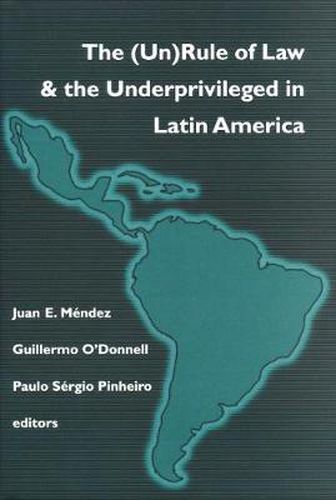Readings Newsletter
Become a Readings Member to make your shopping experience even easier.
Sign in or sign up for free!
You’re not far away from qualifying for FREE standard shipping within Australia
You’ve qualified for FREE standard shipping within Australia
The cart is loading…






This thorough discussion of the idea of democracies without citizenship in Latin America considers overcoming political violence and discrimination and analyzes various avenues to institutional judicial reform. The (Un)Rule of Law and the Underprivileged in Latin America, as the fourth part of Project Latin America 2000 from the Helen Kellogg Institute, enlarges the understanding of significant political, economic, and social issues facing Latin America at the threshold of a new century. The contributors develop arguments around the Latin American system of law which only punishes the poor and marginalized. In addressing lawless violence, the contributors argue that it is no longer the democratic state that directly commits the abuses. Instead, it fails to control arbitrary practices of its own agents and to challenge those who flaunt disregard for the law. The collection demonstrates that it is impossible to separate judicial reform from human rights and argues that justice must be made accessible to the poor and that governments make a serious and comprehensive commitment to social reform.
$9.00 standard shipping within Australia
FREE standard shipping within Australia for orders over $100.00
Express & International shipping calculated at checkout
This thorough discussion of the idea of democracies without citizenship in Latin America considers overcoming political violence and discrimination and analyzes various avenues to institutional judicial reform. The (Un)Rule of Law and the Underprivileged in Latin America, as the fourth part of Project Latin America 2000 from the Helen Kellogg Institute, enlarges the understanding of significant political, economic, and social issues facing Latin America at the threshold of a new century. The contributors develop arguments around the Latin American system of law which only punishes the poor and marginalized. In addressing lawless violence, the contributors argue that it is no longer the democratic state that directly commits the abuses. Instead, it fails to control arbitrary practices of its own agents and to challenge those who flaunt disregard for the law. The collection demonstrates that it is impossible to separate judicial reform from human rights and argues that justice must be made accessible to the poor and that governments make a serious and comprehensive commitment to social reform.